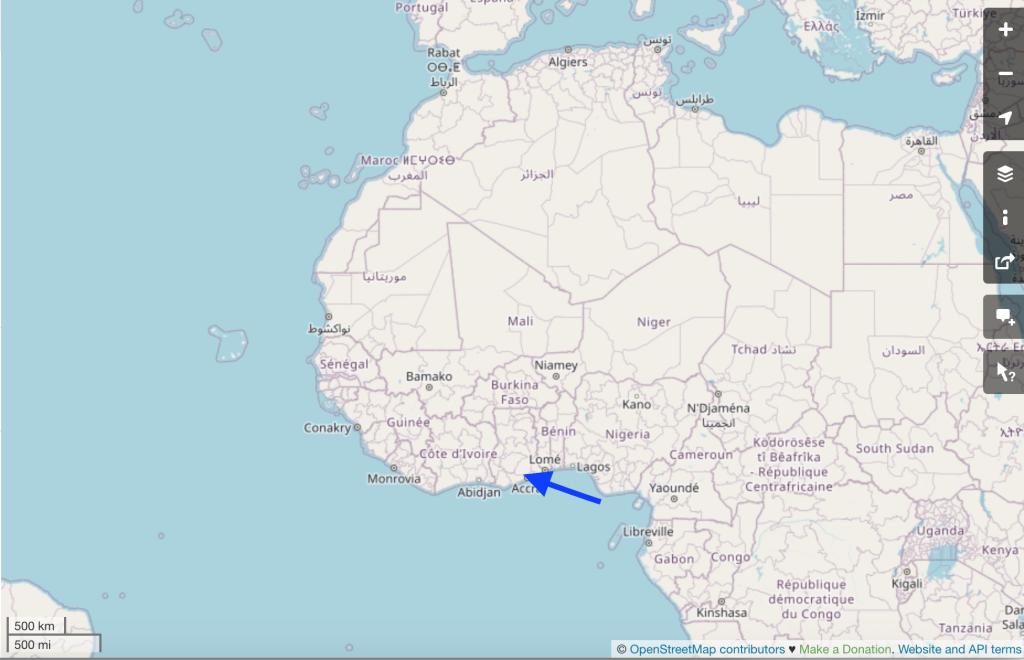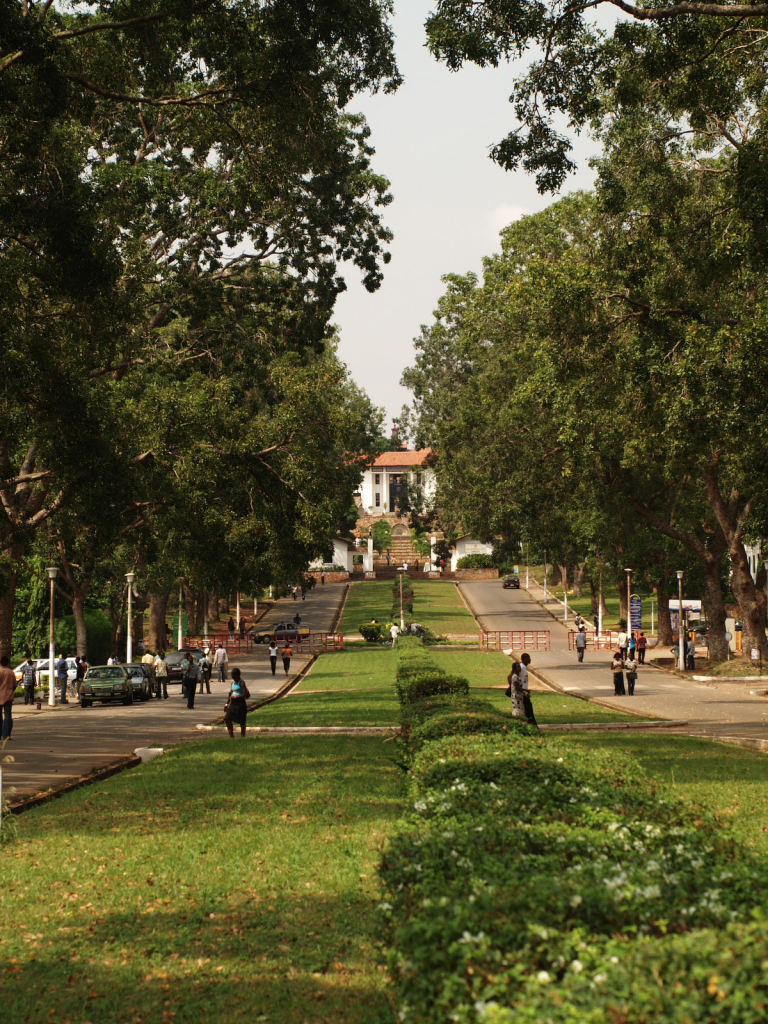Hello! It’s been a while since I’ve blogged, last time was at the observatory using MagAO (Classic). Others have written about time spent on a submarines or in virtual worlds, which I think are excellent training for isolation, I’m going to opine a bit about the value of travel and particularly study abroad for coping with staying at home. And share some pictures (all shot in 2007 on a circa 2003, five megapixel, Olympus E-1 with circa 1970s manual focus Olympus Zuiko lenses) .

In 2007 I studied at the University of Ghana (UG), in Legon, which is just north of the capital Accra. Ghana is on the horizontal stretch of the eastern African coast, between Cote d’Ivoire and Chad (blue arrow below).

There are lots of ways this experience prepared me for this pandemic, some humorous and some practical.
As international students visiting via a US university’s program, we lived on campus in relatively spiffy dorms where we only had one roommate and where we had running water. They didn’t have all the comforts of home however. I learned quickly upon arriving in the dorms that toilet paper was a valuable commodity, a college classmate who was from Nigeria had packed his suite case with rolls of Charmin and I felt a bit silly with all my hand sanitizer and no “T-Roll”.
Fortunately, the dorms were close to the campus Night Market, seen below after a heavy rain. My room was in the distant building, second floor, furthest to the left. The Night Market was nearly a one-stop-shopping experience, from T-Roll to sandal repair and fresh food, with stalls specializing in Fufu (pounded casava), RedRed. My standby dinner was Waakye, a dish of rice and beans that you could buy hot, served in a plastic bag, for tens of cents. I chose to eat a lot of Waakye, it was a complete protein, it was tasty, it was fully cooked, and it left a lot of money in my pocket for travel. But it was surprising to me how easy it was to eat well on a few dollars a day, day after day, on rice and beans (and bread, eggs, and oatmeal).

The Night Market was pretty complete shopping, and it was possible to live frugally, but that also made big splurges, like dinner in Accra at a Lebanese restaurant that much more enjoyable. And re-entry shock is real, and in my experience, the primary symptom is wandering supermarkets. Consider yourself warned.
The dorms also had prominent public health signage, something that may be coming to US dorms this fall, while the focus is now on a new virus, these messages might be a template:

All that scrimping on food meant travel, and the travel didn’t disappoint, a 20+ hour bus ride to the Sahel and Mole National Park (go national parks!) meant wildlife sightings under the watchful eye of rangers, the unique pain of Tsetse fly bites, and the unique camaraderie fellow travelers.



On the more serious side, many of us came down with serious diseases, including malaria, despite prophylaxis while we were studying in Ghana. We were grateful for the treatment we received and that experience made clear the physicians and nurses in Ghana and other African countries are top-notch: educated, curious, and committed to their patients. But even before COVID19, they severely lacked the equipment to provide the care they knew was possible, making it even more imperative to “flatten the curve” in countries with just a few ICU beds. The WHO is publishing Africa SITREPs on CV19 if you want to keep an eye on things. This lack of equipment is just one symptom of a long history of colonization, maximally illustrated by the heart-wrenching slaves castles along this “Gold Coast”.

Studying physics in a low-resource environment brought it’s own challenge and learning opportunities. Much like today, where we’re cutoff from physical books in campus and department libraries, when I was studying E&M and solid state physics in Ghana resources like PDFs of course notes from MIT Open Courseware went from being nice to invaluable. My Ghanaian classmates were also more essential to learning than my classmates in the states, they were masters of logistics and could find textbooks and information that befuddled me.

Study abroad anywhere is training for today because normal is different in every time and place. Upending all your normal habits, books, problem sets, cafeterias and moving them across the world is training in the sense that it shows you how to adapt, and find the limits of that adaptation. (Malaria– not easy to adapt to; rice and beans, no problem). If we are OK and used to accommodating new normals in the context of human experience, and work on ways to improve them, it’s easier to focus on today and tomorrow, rather spending too much time trying to get back to the way things were. Like going to supermarkets or having nice toilet paper. Both are overrated. Stay safe at home, and when it’s safe, go train for the next pandemic and see the world.
MUSIC
I think music is in the rules still. I’m going to resist my natural tendency just to revert to Springsteen. Here goes.
Africa, but improved by Weird Al’s accordion:
Many Ghanaians have spectacular dancing and musical skills, unfortunately neither rubbed off on me during my semester there (despite several organized, multi-day interventions by professionals). These guys have some moves though:
And finally, to maximize our musical diversity, this is one of the first songs that popped into my head that I first heard while I was at University of Ghana (and isn’t by the Boss…):
Good night and nante yie (walk well, in Asanti Twi)